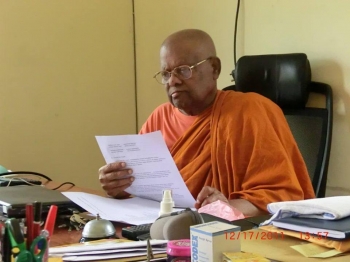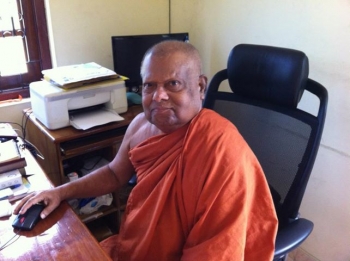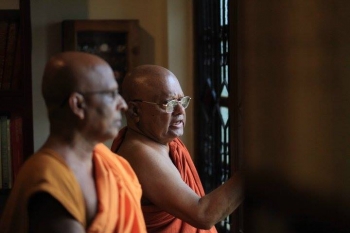P?mojjabahulo bhikku pasanno Buddhas?sane
Adhigacche pada? santa? sa?kh?rupasama? sukha?.
Full of joy, full of faith in the teaching of the Buddha, the monk
attains the peaceful state, the bliss of cessation of conditioned things.
– Dhammapada v. 381
I was saddened to hear that Venerable Anuruddha, or Bhante as his students called him with affection, respect and warmth, had passed away in Sri Lanka on 29 September, 2013 at the ripe old age of 84 after a long illness. The world of Pali studies and Pali language have suffered a great and irreparable loss with his passing. There is now a vacuum at the Centre of Buddhist Studies of the University of Hong Kong where he taught Pali and Pali Suttas for ten years. He will also be sorely missed at Chi Lin Nunnery.
I neither wish to write an obituary because of its gloomy connotations nor a eulogy which stresses the praiseworthy. Rather, I wish to stay to the Buddhist middle way of celebrating Bhante’s life through my remembrance of him. Naturally, this will be personal but I am sure all his other students will have had similar experiences and feelings.
I was fortunate to be one of the students in the last batch he taught at the Centre before Bhante finally returned to Sri Lanka. I took both of his courses, Basic Pali and Reading Pali Suttas. My first contact with Bhante came on the Orientation Day when he briefly introduced his courses to the students. I remember his stern face which, nevertheless, shone with warmth and kindness when he smiled. What impressed me were two things, one was his statement which he often later repeated in class, that we had to learn to use our memory in studying Pali rather than simply relying on handouts or the text book; we had to learn through empirical experience. In fact, he steadfastly refused to use the computer or power point in his classes as he delighted to tell us with a smile at the Orientation! When I heard this, I too smiled with delight as I never used power point in my lessons.
Second, the academic erudition of his subject material which he demonstrated and his flawless recitation of Pali totally from memory convinced me to take his courses. I knew I would be in safe hands in his lessons although I sensed there would be high expectations placed on us as students.
We began every lesson standing up and bowing to Bhante before sitting down. He placed his tea on the table and sat quietly while looking at each one of us before clearing his throat and beginning the lesson, stopping every so often to allow us time to reflect and understand, as well as to answer questions.
Bhante used the Socratic method so we all had to do our homework and listen carefully because he only occasionally used the white board. I found this academically stimulating but I was on the edge of my seat in case he asked me a question which he did frequently. Bhante would smile with kindness and chuckle with kindly indulgence when I made a mistake to make me more mindful of what I was thinking and saying.
Whenever I think of Bhante, two touching points always spring to mind; one human and the other academic. The human touch was that he never failed to remember my name. There were two Johns in our class, myself (John Cannon) and John Shannon, but he was always able to distinguish between the two of us which was not easy as we sat together. Remembering names of students by teachers is a special gift and highly appreciated.
Second, Bhante frequently recited from Pali scriptures totally from memory which gave me a strong feeling of the oral aspect of the transmission of knowledge within the early Buddhist tradition. To paraphrase from a sutta in which the Buddha tells one of his overly attached followers that he can see the Buddha through the Dhamma, with respect to Bhante:
“he who sees Bhante, hears Pali,
he who hears/reads Pali sees Bhante.”
For me this is Bhante’s greatest gift to me as his student and because of him my love and interest in Pali language and literature was strengthened and nurtured. I believe that all of his students and those who were fortunate to have been touched by him during his long life will agree with me that the main sensation, vedan?, that Bhante exhibited to all of us was metta, loving kindness.
While saddened by his loss, I also rejoice and celebrate his life and how lucky I am to have been one of his students. Also, all of us should rejoice in the confidence that Bhante, as an exemplary human being and monk, has reached the other shore. Sadhu! Sadhu!
Eko sisso bhadantassa Anuruddhassa ca p?liy? ca.
(One student of Bhante Anuruddha and (of) Pali.)

















